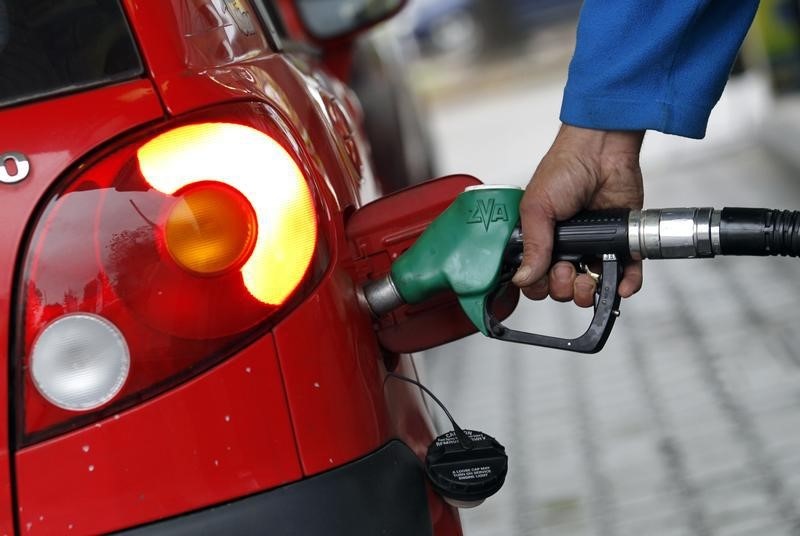Wells Fargo sizes worst-case OI scenario for Amazon grocery
* Government said subsidies ended in March; price cap since
lifted
* Oil marketers say petrol cost govt 30 naira/litre in Feb
* NNPC's Kyari says full price float could hurt consumers
* Pump prices have risen, citizens struggling to afford fuel
By Libby George
LAGOS, Feb 18 (Reuters) - Dauda Adekanbi drives one of the
hundreds of yellow minibuses that weave through Lagos, Nigeria's
thrumming commercial capital.
Customers line up despite the coronavirus pandemic. But he
has a different problem: rising petrol prices.
"Fuel is the only thing the government keep increasing," the
50-year-old told Reuters on a busy Friday afternoon.
While Adekanbi is feeling the pinch, observers say
government coffers are at risk, too.
Nigeria said in March that it had ended costly fuel
subsidies, and announced in September it was no longer fixing
pump prices. Since then, Lagos prices have risen to just over
160 naira per litre from 145. But state oil company NNPC remains the country's sole
gasoline importer, and its group managing director, Mele Kyari,
said that, if prices floated with no control, that could hurt
consumers.
"Government is very keen on making sure that people are not
exploited," he told Reuters in an interview.
Four private importers, one former NNPC executive and a
source close to the company said it was still setting gasoline
prices – but at fuel depots rather than at the pump.
Those prices, set using an unpublished template, block
private companies from importing, leaving the government as also
the sole gasoline seller and opening it to continued losses.
NNPC's Kyari insisted there was no allocation for fuel
subsidies, elimination of which was among conditions for a $1.5
billion World Bank budget support loan. The Bank did not
comment.
But Tunji Oyebanji, chairman of the Major Oil Marketers
Association, said NNPC was losing at least 30 naira ($0.08) per
litre on gasoline in early February, based on the international
fuel price and the publicly available dollar exchange rate.
With daily consumption of roughly 40 million litres, that's
1.2 billion naira ($3.15 million) per day, at a time when low
oil prices have left Nigeria's budget 5.60 trillion naira in
deficit.
"The reality of it is that whether it's subsidy, (whatever)
you want to call it... it's still happening," Oyebanji told
Reuters at his office in Apapa, the port where most fuel enters
Nigeria.
UNSUSTAINABLE
Nigeria, Africa's largest oil exporter, imports all its
fuel, a sore point for its government.
Its 200 million citizens view cheap petrol as one of the few
consistent benefits from a system where graft and inefficiency
are ingrained.
Unions threatened strikes after price increases last year,
and rumours of pump price rises of just a few naira sparked fuel
queues and shortages across Lagos this week.
But subsidies cost some 10 trillion naira between 2006-2018
– more than the health, education or defence budgets.
NNPC's Kyari said the current system was temporary, and the
government was working on a permanent mechanism to enable
market-based prices, and private sector imports, while
protecting consumers.
In the meantime, observers say the lack of transparency
means consumers can't know if they are getting a fair price – or
budget watchdogs if the government is losing money.
"It has become more confusing," said Bello Rabiu, a former
NNPC chief operating officer and group executive director. "Any
time there is no transparency, definitely there will be
corruption."
A copy of the unpublished template seen by Reuters does not
outline what dollar exchange rate or international fuel price
NNPC is using to set ex-depot prices.
A shortage of dollars at the Central Bank's rate of 381
naira means it would take private importers six months to get
enough official dollars for just one cargo of gasoline, Oyebanji
said.
Tapping the more liquid parallel market, which according to
AbokiFX has varied from 440 to 500 naira since September, would
price private importers out.
Meanwhile, Oyebanji and others said, using government oil
cargoes to exchange for fuel effectively provides subsidized
currency.
Back in his yellow bus, Adekanbi is mulling his own
solution: switching to a diesel engine. The fuel is not
regulated, and more expensive.
But he says it lasts longer in his tank – and he doesn't
have to worry about shortages.
($1 = 381.0000 naira)
<^^^^^^^^^^^^^^^^^^^^^^^^^^^^^^^^^^^^^^^^^^^^^^^^^^^^^^^^^^^
Subsidies dog Nigerian gasoline prices https://tmsnrt.rs/3aswezy
Gasoline has cost Nigeria billions in recent years https://tmsnrt.rs/2NCHekB
^^^^^^^^^^^^^^^^^^^^^^^^^^^^^^^^^^^^^^^^^^^^^^^^^^^^^^^^^^^>
